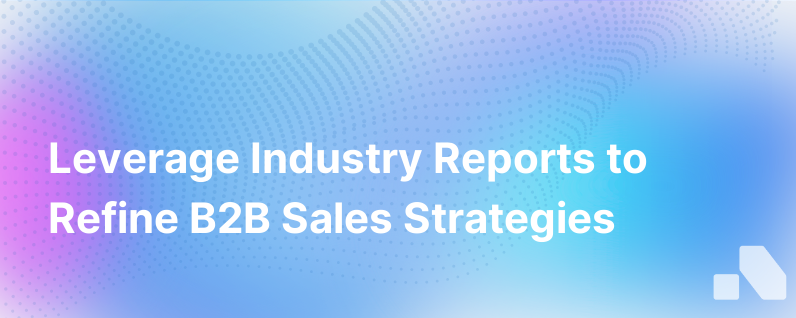
In the modern hyper-competitive B2B landscape, harnessing actionable insights is not merely an advantage—it's an imperative for success. Industry reports are treasure troves of empirical data and inferences that can sharpen your sales strategy to a fine point, enabling precise targeting, informed positioning, and the kind of compelling, context-rich engagements with prospects that lead to profitable relationships and successful closures.
The Strategic Importance of Industry Reports
From emerging market trends to granular competitor analyses, industry reports are the window to an omnipresent vista of the B2B market's ever-shifting dynamics. These reports can act as a GPS for navigating the labyrinth of B2B sales intricacies, pointing you towards untapped market segments, highlighting burgeoning economic shifts, or revealing the soft underbelly of a rival's market strategy. A thorough dissection of such reports is tantamount to possessing a cheat sheet that aligns your sales strategies not with where your industry has been, but where it's headed.
Unpacking Industry Reports for Maximum Yield
To turn these documents into actionable intelligence, it's critical to extract, interpret, and tactically deploy the insights they contain. Here's how to drill down into the granular data and big-picture summaries that industry reports offer:
Market Sizing and Segmentation
Start with an unvarnished view of your operating arena. Is the market growing or retracting? How are segments defined and measured? These metrics set the stage for establishing realistic, data-backed sales targets and identifying segments ripe for expansion.
Competitive Analysis
Next, equip your sales team with the intelligence to outmaneuver competitors. Which players are winning, which are lagging behind, and why? Harness this data to underscore your unique value proposition and to preempt counter tactics.
Purchasing Patterns
Understanding your customers' buying behavior allows for preemptive strategy formulation. What catalyzes their decision-making process, and what factors could potentially derail or delay it? Tailor your sales pitches to address these drivers seamlessly.
Technological Progressions
Especially pertinent in B2B tech sales, where the landscape evolves at breakneck speed, staying current on emergent technologies can catapult your solutions to the top of the consideration pile. These insights are indispensable for positioning your offering as cutting-edge and crucial.
Regulatory Changes and Economic Fluctuations
In industries susceptible to regulatory tides or economic storms, foresight is worth its weight in contract ink. Being ahead of these changes allows for agility—an increasingly lucrative commodity in sales strategy planning.
Strategy Implementation Through Industry Report Insights
Tactical Positioning
Utilize insights from reports to bolster your product's placement in the market. Highlight aspects that respond directly to trending industry needs, align with forecasted market growth, or negate a competitor's perceived strength.
Sales Enablement and Training
Empower your sales force with knowledge that transcends the standard sales script. Industry-specific data equips them to engage in more profound, consultative discussions with prospects, elevating the sales conversation from transactional to transformational.
Customizing Sales and Marketing Materials
Armed with deep industry knowledge, craft marketing collateral that resonates with authenticity and addresses the pinpointed needs of both current and potential clientele. It's customization—grounded in data—that distinguishes persuasive communication.
Account Planning and Forecasting
With strategic insights at hand, refine account planning processes and future-proof your sales forecasts. Predictive analytics, informed by industry report trends, not only predicts future sales but also galvanizes the entire sales funnel from prospecting to close.
The Ongoing Value and Iteration
Engage industry reports not as static resources but as evolving compendiums of sales strategy refinement. Revisit them regularly, juxtapose their forecasts against real-world outcomes, and hone your strategy for iterative improvement. Building a repository of report insights can serve as a historical ledger, charting successes and lessons for future sales conquests.
Integrating Aomni into the Equation
Amidst the rigor of dissecting industry reports, a platform like Aomni emerges as an invaluable ally. By delivering real-time account research, competitive insights, and personalized sales content, Aomni can help decipher and operationalize the insights gleaned from industry reports. Its robust AI-driven platform synthesizes vast volumes of data, making the assimilation of industry knowledge into your B2B sales strategy a process that's both efficient and dynamically responsive to market conditions.
Harnessing industry reports to glean insightful strategies is not just about an accumulation of knowledge—it's about the deliberate, strategic application of that knowledge. Used sagaciously, these reports enable B2B sales strategies to evolve from simple pitches to pointed narratives, wherein lies the real art of deal-making.
In the dense thicket of B2B sales, where each lead could be the next pivotal account, and every pitch could set the sales curve soaring, industry reports are not just helpful—they are essential catalysts for growth, strategy, and triumph.
Sources:
- How do you integrate B2B marketing research data and insights into your CRM and marketing automation systems?
- B2B Sales - Reports, Statistics & Marketing Trends
- Why is market research important in B2B? Exploring the benefits
- 5 overlooked B2B market research methods for understanding your customers
- The Ultimate Guide to Sales Analysis Reports
- How to Perform a Sales Analysis (Step-by-Step): Methods & Metrics
- Most Valuable Types of B2B Sales Content